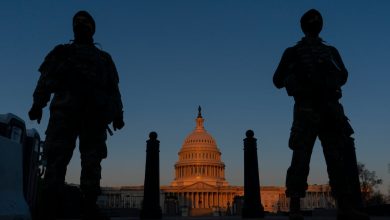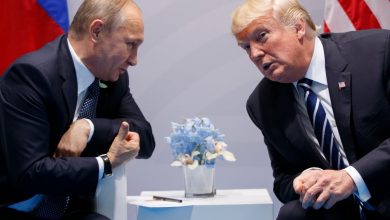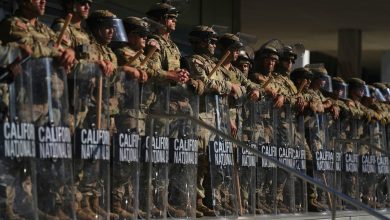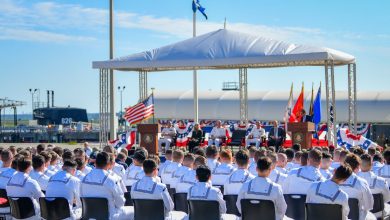‘Imminent’ threat? Hegseth escalates tone on China in key Asia speech
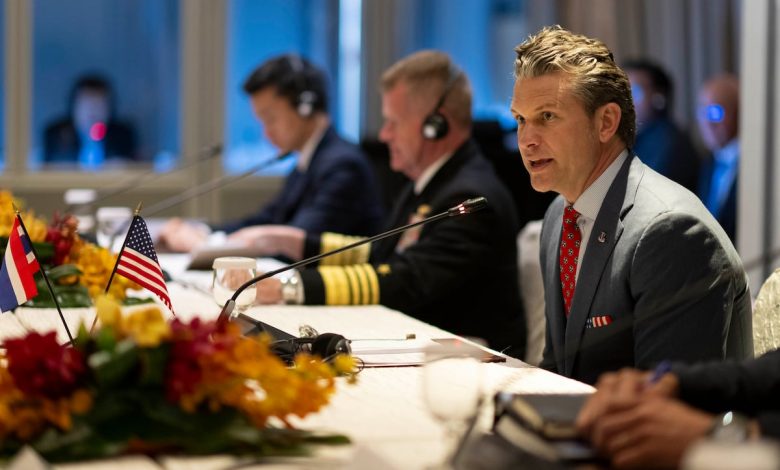
SINGAPORE — U.S. Defense Secretary Pete Hegseth urged allies to raise defense spending and warned that China may pose an “imminent” military threat in a landmark speech on the Trump administration’s approach to Asia.
“There’s no reason to sugarcoat it. The threat China poses is real, and it could be imminent,” Hegseth said at the Shangri-La Dialogue, a defense summit held in Singapore.
The assessment is a major departure for the United States government, where officials spent the last several years arguing that conflict with China “is neither imminent nor inevitable.”
But the shift reflected the Trumpian view of the region Hegseth offered — one in which countries may need to choose between dueling superpowers and U.S. allies should do far more to counter China’s threat.
“We are preparing for war in order to deter war to achieve peace through strength,” Hegseth said.
His remarks Saturday had been highly anticipated as countries across Asia try to understand the Trump administration’s approach to the region. The secretary’s speech in Singapore is seen as a guide to America’s policy toward the Indo-Pacific, and Hegseth is the most senior member of the U.S. government to address the topic this year.
Adding to the interest was China’s decision not to send its defense minister to the conference, a departure from tradition. A senior U.S. defense official told the traveling press that the Pentagon hoped to exploit that gap, and Hegseth mentioned it in his speech.
“We are here this morning, and somebody else isn’t,” he said.
Hegseth visited the Philippines and Japan in March, where he signaled the Trump administration would remain focused on the region. But other signals from the Defense Department have since been mixed.
During a bombing campaign in Yemen earlier this year, Hegseth redirected U.S. military assets away from Asia toward the Middle East. And the Pentagon still lacks nominees to run policy for China and the Indo-Pacific overall.
In the speech, Hegseth affirmed that the region is still America’s “priority theater,” which has been a consensus in Washington for the last decade. While he skewered the Biden Pentagon for years of “deferred maintenance” on the military, his remarks mostly represented continuity with the last four years.
The secretary mentioned multiple times how much the U.S. values its allies and partners. He said America’s military would continue sending forces to the western Pacific. And he even mentioned several initiatives started under the previous administration as examples of American focus.
But far different were Hegseth’s comments on defense spending. Keeping with the administration’s approach thus far, he argued that U.S. allies needed to accept a larger military burden rather than rely on America’s longtime role guaranteeing the region’s security.
“We ask, and indeed we insist, that our allies and partners do their part,” Hegseth said of other countries’ defense budgets.
In an ironic twist that Hegseth himself acknowledged, he urged that countries in the Indo-Pacific look to the example of Europe, which is now increasing military spending after seeing the U.S. hedge on its commitment to defend the continent.
In recent years, U.S. allies from Australia to Japan have announced increases in defense spending, though some officials now in the Pentagon have argued those pledges still don’t match the severity of the moment.
Days before the conference, Elbridge Colby, the Pentagon’s head of policy, posted on X that countries should aim to spend 5% of GDP on defense, a goal NATO is trying to meet over the next decade.
“This is the new standard for our allies around the world, especially Asia,” Colby wrote.
Going further, Hegseth warned nations against splitting their relationship between Washington and Beijing, even along different lines.
“We know that many countries are tempted by the idea of seeking both economic cooperation with China and defense cooperation with the United States. Now that is a geographic necessity for many, but beware the leverage that the CCP seeks with that entanglement,” Hegseth said, referring to the Chinese Communist Party.
While many nations in the region prefer to rely on America for security, China is also their main trading partner and hence a force they can’t ignore. Hegseth’s predecessor, Lloyd Austin, used his speeches at the Shangri-La Dialogue to reassure such countries they wouldn’t need to take sides in the larger competition between the two superpowers.
French President Emanuel Macron, who gave the keynote address at the conference on Friday, warned against changing that policy.
“The main risk today is a risk of division of the world and the division between the two superpowers and the instruction given to all the others: ‘You have to choose your side,’” Macron said.
Despite the sharp rhetoric, Hegseth argued that the U.S. doesn’t want to “dominate or strangle China” and certainly doesn’t seek conflict. But he said America wouldn’t accept China’s increasingly aggressive behavior toward it or its allies.
Specifically, he mentioned China’s actions in the South China Sea — where it’s rammed Philippine coast guard and fishing vessels — and around Taiwan, a self-governing island China claims as its own territory and has threatened to take by force.
In recent years, the People’s Liberation Army has staged more complex military drills around Taiwan. The head of U.S. Indo-Pacific Command has called these “rehearsals” for a future blockade or invasion, a description the secretary also used.
Hegseth also repeated a claim by President Donald Trump that China would not invade Taiwan in the next four years and that America’s primary goal was to avoid such a conflict.
“But if deterrence fails,” he said, “we are prepared to do what the Department of Defense does best and fight and win decisively.”
Noah Robertson is the Pentagon reporter at Defense News. He previously covered national security for the Christian Science Monitor. He holds a bachelor’s degree in English and government from the College of William & Mary in his hometown of Williamsburg, Virginia.
Read the full article here




